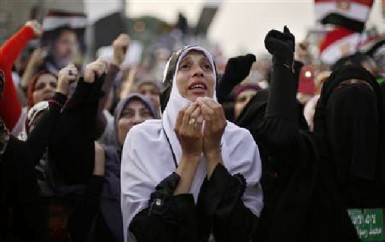CAIRO (Reuters) – Egypt’s interim head of state has set a speedy timetable for elections to drag the Arab world’s biggest country from crisis, after the military ouster of Islamist President Mohamed Mursi last week sparked a wave of bloody protests.

A decree issued by Adli Mansour pointed to a parliamentary ballot within about six months with a presidential vote to follow. However, it was faulted for repeating flaws in the 2011 transition plan that contributed to the current crisis.
The need for a political breakthrough is pressing.
At least 51 people were killed yesterday when the army opened fire on Mursi supporters camped outside Cairo’s Republican Guard barracks where the deposed leader is believed to be held.
The military said it opened fire in response to an attack by armed assailants. On Friday, clashes between pro- and anti-Mursi supporters swept Egypt and left 35 dead.
Mursi’s Muslim Brotherhood movement called for more protests today, raising the risk of further violence, although an umbrella group representing anti-Mursi protesters said they would not demonstrate.
The bloodshed has shocked Egyptians, already tired of the turbulence that began 2½ years ago with the overthrow of autocrat Hosni Mubarak in a popular uprising.
It also raised alarm among key donors like the United States and the European Union, as well as in Israel, with which Egypt has had a US-backed peace treaty since 1979.
Millions of people took to the streets on June 30 to demand Mursi’s resignation, fearing he was orchestrating a creeping Islamist takeover of the state – a charge the Brotherhood has vehemently denied.
But for many Islamists, the overthrow of Egypt’s first freely elected president was a bitter reversal that raised fears of a return to the suppression they endured for decades under autocratic rulers like Mubarak.
Protesters said yesterday’s shooting started as they performed morning prayers outside the barracks. But military spokesman Ahmed Ali said that at 4 am (0200 GMT) armed men attacked troops in the area in the northeast of the city.
Emergency services said 435 people were wounded.
At a hospital near Cairo’s Rabaa Adawiya mosque, where many of the wounded and dead were taken, rooms were crammed full, sheets were stained with blood and medics rushed to attend to those hurt.
“They shot us with teargas, birdshot, rubber bullets – everything. Then they used live bullets,” said Abdelaziz Abdel Shakua, a bearded 30-year-old who was wounded in his right leg.
Mustafa Shalaby, a young doctor at the hospital – one of at least three places where casualties were taken – said he counted 45 dead and more than 400 wounded.
A Reuters journalist at the scene saw first aid helpers attempting mouth-to-mouth resuscitation on a dying man.
Film broadcast by Egyptian state TV showed Mursi supporters throwing rocks at soldiers in riot gear on one of the main roads leading to Cairo airport.
Young men, some carrying sticks, crouched behind a building, emerging to throw petrol bombs before retreating again.
The graphic scenes came just three days after Cairo, Alexandria and other cities and towns were rocked by running street battles between Mursi’ssupporters and opponents, which went on for hours despite a heavy military presence.
Mansour decreed that Egypt will hold new parliamentary elections once amendments to its suspended constitution are approved in a referendum – a process that could take about six months, less than some people had expected.
In what appeared to be an olive branch to Islamists, the decree included controversial language put into the constitution last year that defined the principles of Islamic sharia law.
Whether that will be enough to lure back the hardline Islamist Nour Party, which had supported the military-led transition plans until Monday’s attack, remains to be seen.
Nathan Brown, a leading expert on Egypt’s constitution at George Washington University in Washington, said that while yesterday’s decree laid out a clear sequence for transition, it repeated many of the mistakes of the post-Mubarak process.
“It was drawn up by an anonymous committee; it was issued by executive fiat; the timetable is rushed; the provisions for consultation are vague; and it promises inclusiveness but gives no clear procedural guidelines for it,” he told Reuters.
The Brotherhood movement has refused to have anything to do with the process, and thousands of supporters have camped out in northeast Cairo for the last five days and vowed not to budge until Mursi returns as president – a seemingly vain hope.
The events have worried Western allies. The United Nations said it was “gravely concerned” about mounting violence in Egypt and said the country was on a “precarious path.”
“The Secretary-General condemns these killings and calls for them to be thoroughly investigated by independent and competent national bodies,” it said in a statement.
The United States, still refraining from calling the military intervention a “coup” – a label that would trigger legal obstacles to continuing aid payments – called on Egypt’s army to exercise “maximum restraint.”
The White House said it was not about to halt aid to Egypt.
The Egyptian military, recipient of $1.3 billion a year from Washington, has insisted that the overthrow was not a coup and that it was enforcing the “will of the people” after millions took to the streets on June 30 to call for Mursi’s resignation.

